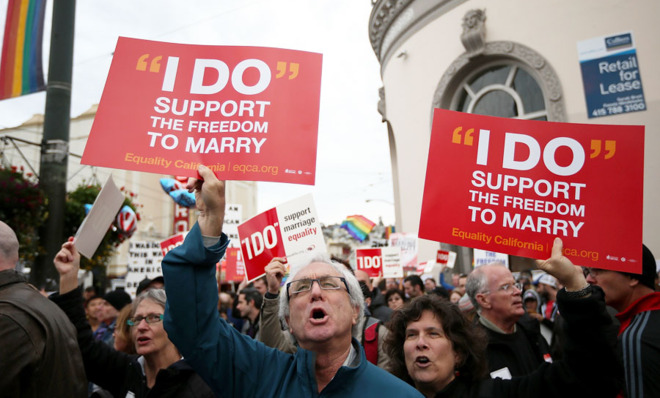For the GOP, gay marriage could be the most important issue in 2016
It may not be a top issue for most voters, but gay marriage gets to the heart of the party's serious image problems


A free daily email with the biggest news stories of the day – and the best features from TheWeek.com
You are now subscribed
Your newsletter sign-up was successful
Almost as soon as the GOP cleans the Democrats' clock in the midterm elections on Nov. 4, attention will turn full force toward the next presidential race.
Will Hillary Clinton run unopposed? Or will someone else — Elizabeth Warren, Jim Webb — try to tap into Democratic dissatisfaction with the prospect of a no-sweat campaign by the Queen of the Centrist Washington Consensus?
On the Republican side, we'll soon be swamped with analysis about what kind of candidate will successfully woo the fractious base of the party. Will it be a centrist (Chris Christie, Jeb Bush)? A libertarian (Rand Paul)? Frank Underwood (Ted Cruz)? George Bush III (Marco Rubio)? Or a professional bulls--t artist (Ben Carson)?
The Week
Escape your echo chamber. Get the facts behind the news, plus analysis from multiple perspectives.

Sign up for The Week's Free Newsletters
From our morning news briefing to a weekly Good News Newsletter, get the best of The Week delivered directly to your inbox.
From our morning news briefing to a weekly Good News Newsletter, get the best of The Week delivered directly to your inbox.
But here's a question I find far more interesting: How on Earth will the GOP handle gay marriage during the 2016 campaign?
Now I realize that at first sight the question doesn't seem that significant. Homosexuals make up a mere 3 percent of the population, and few of them will be inclined to vote for a Republican, regardless of whether the party's nominee embraces gay marriage. And even if they could be persuaded to switch parties, most of them live in solidly blue states where their change of heart would have a marginal electoral impact.
As for heterosexual social liberals, for whom gay marriage might be an important issue in voting, they may be even less likely to cast a ballot for a pro-gay Republican, since their attachment to the Democrats runs so deep across so many other issues.
And yet I still think the gay marriage question will prove to be crucially important in 2016 — because of what political consultants call "optics." When voters size up the GOP in the summer and fall of 2016, will they see a modern, forward-looking party that's comfortable with and affirming of a recent irreversible social trend that's supported by a majority of Americans? Or will they instead see an angry party of sexual Dixiecrats eager to champion a losing, increasingly unpopular cause?
A free daily email with the biggest news stories of the day – and the best features from TheWeek.com
"Dixiecrats" is, of course, an allusion to the drama of 1948, when a conglomeration of white Southerners bolted the Democratic Party in an ultimately doomed effort to preserve the rule of white supremacy (and above all, segregation) across the South. In making the reference, I don't mean to imply any simple parallel between the postwar movement for black civil rights and the push for gay marriage today. As I've argued on numerous occasions, sexual traditionalism is much more deeply rooted in Christian scripture and theology than racism ever was, and so those who deny the legitimacy of same-sex marriage have a much stronger and more morally respectable case to make in their own defense.
But if the moral parallel is complicated, the political parallel is as straightforward as can be. In both cases, supporters of a fading order faced a choice of whether to accept and make the best of the new dispensation or to take a futile stand in a grand gesture of solidarity with the old way.
Dying with honor for the sake of a doomed, noble cause is an old Southern-Confederate trope — and it just so happens that opposition to gay marriage, like support for the Republicans, is strongest in the South. That's why the party's position on the issue is so important. More than anything else, it will determine whether the GOP sounds and acts like a confident, national party — or a party channeling an irritable, self-destructive protest by culturally alienated voters in one region of the country.
The Republicans also run the risk of appearing gratuitously mean if they take a position in favor of stripping married same-sex couples of the rights they've already been granted in dozens of states across the nation. This will be compounded if they combine that stance with uncompromising opposition to immigration reform, which now appears to be a non-negotiable demand of the GOP base.
Despite what some on the right would like to believe, presidential elections (as opposed to elections in gerrymandered House districts) are still decided in the middle of the ideological spectrum. And in 2016 the GOP runs the risk of taking stands that place them at considerable distance from the median American voter.
Gay marriage isn't the only issue on which Republicans will have to make a decision about who they want to be. But it may be the most portentous one.
Damon Linker is a senior correspondent at TheWeek.com. He is also a former contributing editor at The New Republic and the author of The Theocons and The Religious Test.
